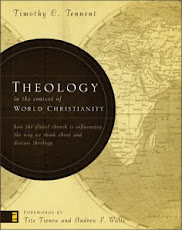4/30/09
4/29/09
Galatians 4:1-11 - 4 Reasons Why Following Slavery is Foolish (Part 1)
INTRODUCTORY REMARKS- The law cannot give you the inheritance- 3 Reasons it is important that Christ was born under the law
- Jesus was obligated to keep the law
- By putting himself under the law, he could be our vicarious substitute
- So that he would satisfy the requirement of perfect obedience
- We were "redeemed by his blood" - 2 Cor 5:214 REASONS (Only the first two this week)1) Because you are a son, not a slave! God is you Dad! (Gal 4:1-7)- Remember the prodigal son- As a believer, you are no longer a slave to sin; rather, you have been adopted into the family of God- Part of this adoption is God sending the Spirit into our hearts (Jer 17:9)
- Before regeneration, our hearts were dead and dirty
- The heart is the core of our being
* Notice that Paul reverts back to using his heart language when he uses "abba" for father - His emotion cause him to use his first language.3 Ways we Revert Back to Slavery
- ADDICTION (remaing/repeated sin)(whatever you struggle with)(Do you look any different than prior to salvation?)
- GUILT (Underestimating Christ's atoning work)
- WORSHIP (the lack thereof or worshipping something other than God)(sons worship; slaves work)
- If givng of your time and money or doing evangelism seem like duties rather than delights, then you are living like a slave.2) Because you are RETURNING to being to being under the slavery of the law again! (Gal 4:8-11)- Paul seems to be putting paganism (turning back for these Gentiles) and legalism in the same category- An example of this in our day is moralistic, therepeutic deism- Notice the emotion when Paul says "I fear that I wasted by efforts" - There is obvious despair, sorrow, and greif- Do we have Paul's passion for the lost or backsliden?
Introducing Francis Chan
4/28/09
Gospel Coalition Media
If you are like me and missed both getting to attend the conference and tuning in to the live webcast, the audio and video content from The Gospel Coalition 2009 National Conference has been made available.
Here are the direct links to each session:
Plenary Sessions
- Tim Keller: The Grand Demythologizer: The Gospel and Idolatry
- John Piper: Feed the Flame of God's Gift: Unashamed Courage in the Gospel
- Phil Ryken: The Pattern of Sound Words
- Mark Driscoll: Rightly Dividing the Word of Truth
- K. Edward Copeland: Shadowlands: Pitfalls and Parodies of Gospel-Centered Ministry
- Bryan Chapell: Preach the Word!
- Ajith Fernando: Gospel-Faithful Mission in the New Christendom
- Panel Discussion: Tim Keller, John Piper, Ligon Duncan and Crawford Loritts
- Ligon Duncan: Finishing Well
- Don Carson: That By All Means I Might Win Some: Faithfulness and Flexibility in Gospel Proclamation
Workshops
- Buster Brown: Preaching in a Christianized Culture
- Graham Cole: Homosexuality and the Bible: Texts, Hermeneutics, and Pastoral Wisdom
- Joshua Harris: Ministering in a Church-Hopping Society
- C.J. Mahaney: The Pastor’s Charge
4/27/09
Galatians 3:15-29 - Law VS. Promise
INITIAL COMMENTSAre we living for Christ in a way that we are following rules or in a way that we are worshiping? Are you a rule follower or a worshipper?The law is not meant to add to the gospel, rather it is meant to point you to the gospel.Most of us are all little legalists at heart – What are the issues you become legalistic about?5 POINTS REGARDING THE LAW VS. PROMISE1) The giving of the law doesn’t change the original promise/covenant (Gal 3:15-18)- God gave the covenant to Abraham in Genesis 12:3- This covenant – the blessing of all nations through Abraham’s offspring, who is Christ – was not negated or altered by the giving of the law through Moses 400 years later- The covenant of blessing through Christ was still God’s planThen, why even give the law?- Paul foresaw this question, so he brings it up2) The law was given because of sin (Gal 3:19-20)- The law was actually given to increase transgression / sin (Romans 5:20)- We didn’t know what sin was until God gave the law to expose our sin- Also, not only does it expose our sin, but it causes us to want to sin (Romans 4:15; Romans 7:5)- Our fallen nature causes us to desire the thing we should not do- In summary, the law clearly defines sin, thereby exposing sin and causing more sin In other words, the law ensures damnation3) Righteousness cannot be attained by law keeping (Gal 3:21-22)- There aren’t two ways to God: Faith or Perfect Obedience- There is only one way to God – receiving grace which results in Faith in Jesus Christ3 possible responses to the law1. We can rebel against it2. We can show complete indifference3. We can thirst for righteousness4) The law was our guardian / tutor / schoolmaster until the promise, which is Jesus, came and created justification by faith (Gal 3:23-25)- The law was both our guide to correct living and the judge declaring us guilty- It sets the standard, but it is an unattainable goal- How do you respond to the law?5) Christ has made us all one (Gal 3:26-29)- Salvation is available to every people group, gender, age, class, etc.- These verses are speaking of equality regarding justification- Paul is not speaking to the issue of women’s roles- Not a support for egalitarianism or complementarianism- God’s chosen people are those people he regenerates from all nations, not a particular nation or people group (Romans 9:6-8)- God is looking for worshippers, not law-keepers- To be an “heir according to the promise,” the only thing required is faithCONCLUDING THOUGHTSIf we are no longer under the law, put the promise,- Then, we should be living for Christ, not a set of rules- Then, our lives, work, actions, and thoughts should be for Christ - We have put on Christ- Then, our response should be worship
Book Review: THE SCANDAL OF THE EVANGELICAL CONSCIENCE
Scandalous behavior is rapidly destroying American Christianity. By their daily activity, most “Christians” regularly commit treason. With their mouths they claim that Jesus is Lord, but with their actions they demonstrate allegiance to money, sex, and self-fulfillment.
The heart of the problem is a one-sided, unbiblical, reductionist understanding of the gospel and salvation …most evangelicals do not even define the gospel the way Jesus did…we have propagated the heretical notion that people can receive forgiveness without sanctification, heaven without holiness.
4/24/09
Book Review: VINTAGE CHURCH
The greatest strength of this book is Driscoll’s transparency regarding the practices of Mars Hill Church. He clearly lays out the practices of the church and the reasons for those practices. This aspect of the book will prove to be extremely valuable to church planters and young leaders. Even if you don’t agree with every structure or practice at Mars Hill, you will at least be forced to think through all of these issues. Some of the issues that I found most useful were his section on the process of appointing elders, women in ministry, multi-site practices, the Lord’s Supper, and baptism.
Another strength of this book is learning from Driscoll’s experience in planting and growing churches over the past twelve years. He planted Mars Hill with a few other people and grew it into one of the largest churches in America. This knowledge combined with his experience as the founder of the Acts 29 church planting network amount to a lot of valuable advice for pastors and planters. He knows what it is like to lead a church at every stage of a church’s life-cycle.
As you can tell, I learned a lot from this book; however, do not mistake this book for a full-blown ecclesiology. Driscoll hits most of the high points, but really camps out in the areas that he has the most to say about; this is obvious by the fact that the chapter discussing “What is the Church?” is the same length as the chapter discussing multi-site churches.
Overall, any pastor, elder, planter, or church member will benefit from this collection of Driscoll’s beliefs, practices, and experiences. Also, this book does contain much of the vintage Driscoll humor, but nothing that crosses the line into vulgar or inappropriate territory. I know this is a concern for many people, but I hope this book and his last effort, Death by Love, represent a maturing Mark Driscoll. I welcome more of his insightful experience.
Read more...Jesus' ministry included feeding the hungry, healing the sick, loving the outcast, and befriending the sinner. But we must never forget that Jesus's ministry began with preaching. (88)For us as missionaries in culture, the tip of the spear for our war against Satan, sin, and death is the sermon, if rightly preached with authority for the purpose of gathering God's people for instruction before sending them out on mission with passion. (101)Pursuing potential rather than calling gets a church off mission... Bluntly stated, most churches are doing too much and doing it poorly. To get and stay unified, church leaders must focus their resources (e.g., people, dollars, facilities, emotion, technology) on accomplishing a few things [we must remain gospel-centered] if they hope to accomplish anything. (146-47)In the days of Nehemiah, God's people rebuilt the wall encircling their city with a trowel in one hand and a sword in another. With the trowel they built, and with the sword they defended [to paraphrase his next few sentences, this means that today in our time, we must both build the church and defend it]... In keeping with this analogy, formative discipline [teaching and training] is trowel work and resotrative discipline [church discipline, which means correction and casting out wolves] is sword work. (171-72)Because we have limited resources (time, energy, money) we must allocate those things to what we consider most important or glorious to us and in so doing make sacrifices for our functional god. Whatever we hold in the position of highest glory is by definition our god(s). (204) [The goal is to have Christ in this position][One problem according to Driscoll is that many churches have] slipped into an attritional ministry philosophy focused almost solely on bringing people into church buildings and events. Such churches lacked a missional philosphy focused on sending Christians out of the church into the world to evangelize and disciple people. Subsequently, the Western church had, sadly, become overly attached to and defined by buildings, programs, staff, services, and institutions that only strategize ways to do "attractional" ministry. To correct this problem, the term missional was adopted to emphasize that the church exists to go into the cultures and nations of the earth and live sacrificially for the good of others. (218)[Regarding large or multi-campus churches] If some churches with good names in their community can multiply and use their good name to compel more people to worship Jesus, then even if you do not consider that ideal, it is better than unknown, empty churches, which are so common. (260)To begin with, before worrying about how to distribute gospel content, you must have good content and lots of it. Just as it makes no sense for a horrible band to play on an expensive sound system because it only amplifies the awfulness, so increasing the channels for content distribution is in vain if the content (e.g., preaching, teaching, worship music) is not biblical and well done. (273)
Rob Bell's Recent Interview
4/23/09
Who's Your Pastor?
Every single church member needs to read THIS ARTICLE by Dan Phillips. He makes a great point that every Christian needs to hear, especially those of us who read books and listen to podcasts (which should be every Christian, but that is another discussion).
I have learned so much from John Piper, D.A. Carson, Tim Keller, Al Mohler, Mark Driscoll, Matt Chandler, and many others, but none of these men are my pastor. I don't attend Bethlehem Baptist or Mars Hill. These men don't know me or my family. These men don't have to be annoyed by me on a weekly basis.
It isn't fair to my pastor if I compare him with these men I have only heard or read, and it certainly isn't loving or gracious. There are many of us who need to listen to this warning concerning "paper pastors." It was a reminder to me that I need to love, serve, and protect my pastor, not compare him to these well known preachers and teachers.
If, while you read this post, you were thinking, "but, my pastor is terrible," then you need to repent for sure. Also, if your assessment is accurate, then you may need to find another church. Either way, begin with repentance. Then, either help your pastor to improve by trying to humbly assist him or find another church. Staying at a church and being a malcontent isn't good for anyone, and it is a terrible representation the gospel.
4/22/09
Great Commission Resurgence within the SBC
Following up my last post regarding the current public perception of the Southern Baptist Convention, I want to recommend this recent chapel sermon at SEBTS (Southeastern Baptist Theological Seminary). A friend directed me to this sermon that Dr. Aiken preached about a week ago. It was very encouraging. If you don't have the proper plugin to view the video above (it's a strange one), then you can watch the video HERE or read the full manuscript HERE.
If you are part of the Southern Baptist Convention, then you need to watch, listen to, or read this sermon.
The Southern Baptist Image
What do you think when you hear ‘Southern Baptist’?
The responses he received speak loudly and clearly. Below is a Wordle put together by Tony Kummer who added the following commentary:
Why does this matter? Bottom line, Twitter users are influencers. They are tech savvy, well education, and super connected. Social media has great power to reflect and move public opinion. . . . This is a chance to see ourselves through the eyes of others. At least in some measure, we are giving Jesus a bad name. It’s time for some healthy humiliation and repentance.

If you look past legalism, legalistic, don’t, and boycott, you will find Jesus and the gospel in 4 point font. Does it bother anyone else that we are more known for Disney and chicken than Jesus and the gospel?
This is a snapshot of why the SBC vehicle does not need a paint job but to be stripped down and rebuilt, starting with the engine of the Cooperative Program. We cannot keep changing the tires with new evangelism initiatives; we need a new delivery system that delivers what we are for rather than what we are against. The day when Jesus and the gospel are descriptive of Southern Baptists is the day when church doors are opening instead of closing, the day when cooperation wins out of controversy, the day when we blog about brokenness and repentance rather than boycotts and resolutions, and the day when a younger generation embraces the future as Baptists rather than walking away from it.
4/21/09
The Gospel Conference at Cornerstone
Gospel Coalition Conference Webcast
This is going to be a great conference. I have several friends attending, but was unable to make the trip (note to self: I need to win the lottery).
beer soda.
4/15/09
The Best and Worst of Times
It is one of the worst times to be a Christian in all of history. We have more media fighting for our attention than ever before. Sin sells, and we are living in a capitalist country (at least for a little while longer). We can now lust after an image on our T.V. screen or computer monitor without ever getting off the couch. I think my point is clear.
- We've got limited time to be about the mission God has put us here for.
- God calls us to rearrange our lives to be on mission with a purpose.
- Wherever God has put you is your mission field.
- If you’re living outside your mission field, then move.
- Why would you shop, eat meals, or go to parks outside your mission field?
- Your neighborhood or apartment complex is your mission field. There can be some overflow to your job or gym or whatever, put your place of residence is primary.
- We need to live, now in America, according to same principles as foreign missionaries.
- Just trying to reach people as you go on your way is only doing missions/evangelism reactively; trying to reach people on your own is reactive missions; we need to be proactive by rearranging our lives and joining with others to reach a neighborhood, school, people, or area.
- It is the church’s job to train its members to be on mission.
- The culture we are in naturally segments our life and there is little integration of our life, but being on mission means rearranging the pieces as necessary to build your life around that mission that Jesus has called you to.
- The best way to defeat despair and depression is to be thankful.
- Most of our own despair and apathy is because we are not thankful enough.
- We are malcontents, despite the fact that Christ died to for us.
- Pride is not how good or bad you think about yourself; pride is how much you think about yourself.
- If you are wallowing in despair and focusing on yourself, then it may be a pride problem.
4/14/09
Vintage Driscoll
 I am currently reading Vintage Church and I am constantly reading Driscoll's blog posts and listening to his sermons and other media, so I am honestly not sure where I got these quotes. All I know is that I wrote them down over the past couple of weeks and have his name beside all of them. These are vintage Driscoll. Enjoy.
I am currently reading Vintage Church and I am constantly reading Driscoll's blog posts and listening to his sermons and other media, so I am honestly not sure where I got these quotes. All I know is that I wrote them down over the past couple of weeks and have his name beside all of them. These are vintage Driscoll. Enjoy.
When is the last time you have just asked, "God, please fill me with your Spirit. Holy Spirit, I need you to teach me." You should pray this every time you open the Scriptures, because we all have a proclivity to suppress the truth due to the unrighteousness of our deeds (see Romans 1).If you wanna be a heretic, just stop preaching repentance, that's all it takes. - Driscoll summarizing J. I. PackerThe importance of the cross to the church is that apart from Jesus' death on it in our place for our sins, the church does not exist and has no good news to tell. It cannot be overemphasized that where the cross of Jesus is not exalted and proclaimed as the central act in all of history and in our own redemption, THE CHURCH IS NOT PRESENT.I can imagine the pharisees saying that we who preach in jeans without tucking in our shirts dishonor God.

4/12/09
The Power of His Resurrection

Today is a great day to begin praying these words of the Apostle Paul:
I want to know Christ and the power of his resurrection and the fellowship of sharing in his sufferings, becoming like him in his death, and so, somehow, to attain to the resurrection from the dead. (Phil. 3:10-11)
4/7/09
Church Planting and Missional Living
Resurgence has recently put up a lot of great media from last year's Dwell Conference and the two most recent Acts 29 boot camps. Also, I found this interview to be very useful. Jeff Vanderstelt is an Acts 29 church planter in Tacoma. Some of his comments are very provoking and insightful. I would love to have some feedback on this interview:
4/6/09
The End of Christian America
This is the cover story of the latest issue of Newsweek. The cover itself reads "The Decline and Fall of Christian America." Although such a cover story may be surprising, the content of the article shouldn't surprise any Christians. Many Christian leaders have been proclaiming or predicting this situation for many years. In fact, the topic for this entire year of the Whitehorse Inn broadcast, with Michael Horton, is "Christ in a Post-Christian Culture." Also, a recent  study done in the Carolina's, and printed in the Charlotte Observer, yielded very similar results. Phud, the Lead Pastor at Remedy Church, recently discussed this article in a blog post. In the end, every survey, poll, or study seems to indicate the same thing, America is becoming less Christian.
study done in the Carolina's, and printed in the Charlotte Observer, yielded very similar results. Phud, the Lead Pastor at Remedy Church, recently discussed this article in a blog post. In the end, every survey, poll, or study seems to indicate the same thing, America is becoming less Christian.
This Newsweek article should prove to be both interesting and insightful, considering that the author interacts with Al Mohler regarding some of the most recent polling data that he believes supports the fact that America is becoming a Post-Christian culture.
4/5/09
Top 50 Books That Have Shaped Evangelicals
While I was working on a project this weekend, I had to cite an older issue of Christianity Today. One of the features in that issue is a list of the "Top 50 Books That Have Shaped Evangelicals," according to Christianity Today. I remember reading this list several years ago and being surprised, and I was surprised all over again when I reviewed this list again. Here are the top 20 from that list:
20. A Wrinkle In Time
Madeleine L'Engle
19. The Cost of Discipleship
Dietrich Bonhoeffer
18. The Divine Conspiracy
Dallas Willard
17. What's So Amazing About Grace?
Philip Yancey
16. Basic Christianity
John Stott
15. The Uneasy Conscience of Modern Fundamentalism
F. H. Henry
14. Let Justice Roll Down
John M. Perkins
13. Evidence That Demands a Verdict
Josh McDowell
12. Power Evangelism
John Wimber with Kevin Springer
11. Celebration of Discipline
Richard J. Foster
10. Evangelism Explosion
D. James Kennedy
9. Through Gates of Splendor
Elisabeth Elliot
8. Managing Your Time
Ted W. Engstrom
7. Rich Christians in an Age of Hunger
Ronald J. Sider
6. The Living Bible
Kenneth N. Taylor
5. Knowing God
J. I. Packer
4. The God Who Is There
Francis A. Schaeffer
3. Mere Christianity
C. S. Lewis
2. Understanding Church Growth
Donald Anderson McGavran
1. Learning Conversational Prayer
Rosalind Rinker
Keep in mind that this list was created in 2006, so nothing recent would have been considered. Nonetheless, I am confused by this list. I would have guessed only about half of these top 20 titles (3-5, 16, and 19 were definitely in my top top 20). At first, I thought the list was just wrong, but then I saw such names as J. I. Packer and Al Mohler on the list of nominators.
I am wondering if this list is actually accurate, and I am just that far outside the norm for evangelical Christians? Or, I am I closer to the norm and the editors of Christianity Today were confused? What do you think? Check out the entire list HERE. Read more...
4/3/09
Obama in the Morning
How about a little Obama in the morning? Let me clarify, Obama in the morning = a hand full of stupid pills and a cup of coffee. Does that sound appealing? It does to a lot of people. Here are some comments from Mark Steyn in the National Review:
Apparently, nothing testifies to the American virtues of self-reliance, entrepreneurial energy and the can-do spirit like joining the vast army of robotic extras droning in unison, “The government needs to do more for me…”
Most Americans don’t yet grasp the scale of the Obama project. The naysayers complain, oh, it’s another Jimmy Carter, or it’s the new New Deal, or it’s LBJ’s Great Society applied to health care… You should be so lucky. Forget these parochial nickel’n’dime comparisons. It’s all those multiplied a gazillionfold and nuclearized – or Europeanized, which is less dramatic but ultimately more lethal. For a distressing number of American liberals, the natural condition of an advanced, progressive western democracy is Scandinavia, and the US has just been taking a wee bit longer to get there.
Even in its heyday – the Sixties and Seventies - the good times in Europe were underwritten by the American security guarantee: The only reason why France could get away with being France, Belgium with being Belgium, Sweden with being Sweden is because America was America. Kagan’s thesis – Americans are from Mars, Europeans are from Venus – will look like paradise lost when the last conventional “great power” of western civilization embraces the death-cult narcissism of its transatlantic confreres in the full knowledge of where that leads. Why would you do anything so crazy? Ah, but these are crazy times: Europeans are from Pluto, Americans are from Goofy.
I wonder what else Obama could do to ensure that America can never recover. I guess I will just have to wait a couple of weeks to see what he does next. The only possible upside I can see to all of Obama’s destruction is that if we become just like much of Europe, then maybe we can follow in their footsteps regarding beer production. Anyone want to share a Heineken and watch America become the next Amsterdam? Read more...
4/1/09
Saddleback Silliness
Two thousand years ago - the Day of Pentecost was the first day of the Christian Church. Acts 2:41 tells us, "About 3,000 people were baptized and joined the church that day." If you'll join us this weekend, history could be repeated at Saddleback! Want to make history?Which of these requirements do you need to complete this Saturday?1. Open your heart to Jesus Christ.2. Attend Class 101: Discovering Your Church Family.3. Sign our membership covenant (explained in class).4. Be baptized the way Jesus commanded and modeled for us.YOU CAN FINISH ALL 4 REQUIREMENTS IN ONE DAY - THIS SATURDAY!EIGHT REASONS TO JOIN THIS SATURDAY & NOT PROCRASTINATE:
- I'm personally teaching Class 101 for the first time in ten years.
- I'm personally baptizing after Class and you'll receive a photo & baptism certificate.
- You'll get a free one year subscription to Purpose Driven Connection magazine. (Never offered before)
- You'll get free copy of The Purpose Driven Church book.
- Your name will be included in the historical list of Saddleback Pioneer Members who joined in our first 30 years. (This Easter is our 30th Easter and I want you included in this list.)
- The class is 1 hour shorter than normal.You can watch session 3 here online now.
- You'll be a part of making Christian history! The largest membership class ever!
- We love you and want you in our family. There is no good reason to procrastinate.

























